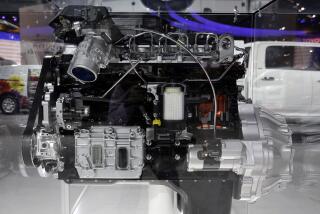Markets / Your Money
- Share via
WASHINGTON — Industrial giant Mitsubishi Corp. of Tokyo agreed to pay a $134-million fine after its conviction for aiding an illegal international cartel--the fourth-largest fine secured in a federal antitrust case.
The payment, approved Thursday by U.S. District Judge Marvin Katz in Philadelphia, came nearly three months after a jury convicted Mitsubishi of aiding seven companies in fixing prices of graphite electrodes, a material used in iron and steel production.
“The prosecution of Mitsubishi and this $134-million fine should send a strong deterrent message to those who participate in or knowingly aid international cartels that increase prices for American businesses and consumers,” said John M. Nannes, acting assistant attorney general in charge of the Justice Department’s antitrust division.
The fine, which stemmed from a lengthy investigation begun under the Clinton administration, represents one of the first major antitrust enforcement actions to be concluded by the Bush administration. For the Justice Department, it also represents a welcome change from the setback it suffered last month when a federal judge dismissed a sweeping case it had brought against AMR Corp.’s American Airlines.
But experts said the fine against Mitsubishi is unlikely to signal how the Justice Department might act in other major antitrust actions such as the landmark Microsoft Corp. case, which now is pending before the U.S. Court of Appeals in Washington.
Andrew Gavil, an antitrust expert at Howard University School of Law, said Republicans and Democrats alike believe that international cartels, such as the one Mitsubishi was convicted of participating in, “should receive the harshest penalties allowed under the law.”
But Microsoft, Gavil said, is another matter. The only similarity between the Microsoft and Mitsubishi cases, he said, is that “they both begin with M.”
The Justice Department and Mitsubishi settled on the fine last month. In addition to the payment, Mitsubishi waived its right to appeal its antitrust conviction. However, the company did not admit to participating in the price fixing.
“While we are firmly convinced the jury verdict was incorrect, this agreement represented a very prudent decision,” said Mitsubishi spokesman Harlan Loeb. “An appeal is an uncertain event, and many times settlement represents the smartest business decision a company can make.”
Six companies and two individuals already have been prosecuted for their participation in the cartel and collectively fined more than $300 million, the Justice Department said.
Mitsubishi profited from the cartel as a trader, selling the electrodes on behalf of some cartel members and as a 50% owner of the world’s largest producer of graphite electrodes, UCAR International.
More to Read
Inside the business of entertainment
The Wide Shot brings you news, analysis and insights on everything from streaming wars to production — and what it all means for the future.
You may occasionally receive promotional content from the Los Angeles Times.










